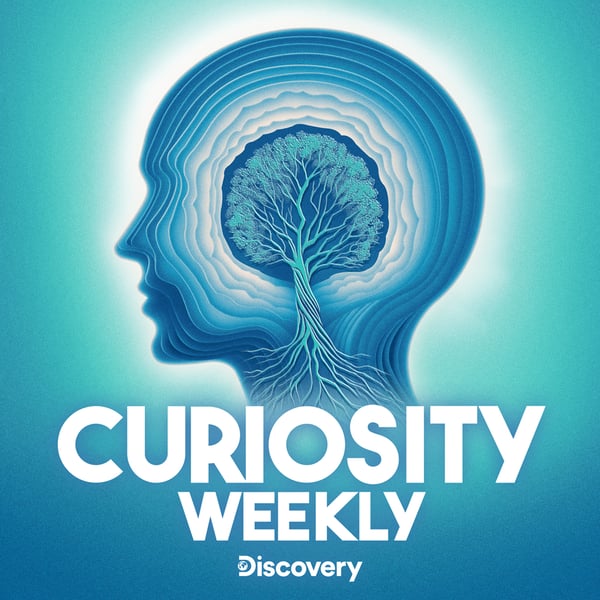Why Uranus Is Sideways, What Blinking Means, and “The Blood Countess”
Curiosity Weekly
Warner Bros. Discovery
4.6 • 935 Ratings
🗓️ 25 January 2019
⏱️ 9 minutes
🧾️ Download transcript
Summary
Learn about why blinking communicates a lot more than you probably thought; why astronomers think Uranus is tipped over; and the story of "The Blood Countess," a female murderer who may have inspired Bram Stoker’s Dracula.
Please support our sponsors! Visit skillshare.com/curiosity for two months of unlimited access to over 25,000 classes for free. Start your two months now!
In this podcast, Cody Gough and Ashley Hamer discuss the following stories from Curiosity.com to help you get smarter and learn something new in just a few minutes:
- Your Blinks Communicate More Than You Think — https://curiosity.im/2swQXeP
- Astronomers May Have Discovered Why Uranus Is Tipped Over — https://curiosity.im/2sy9Fmk
- The Female Murderer Known as "The Blood Countess" May Have Inspired "Dracula" — https://curiosity.im/2swQrgL
If you love our show and you're interested in hearing full-length interviews, then please consider supporting us on Patreon. You'll get exclusive episodes and access to our archives as soon as you become a Patron! https://www.patreon.com/curiositydotcom
Download the FREE 5-star Curiosity app for Android and iOS at https://curiosity.im/podcast-app. And Amazon smart speaker users: you can listen to our podcast as part of your Amazon Alexa Flash Briefing — just click “enable” here: https://curiosity.im/podcast-flash-briefing.
Find episode transcript here: https://curiosity-daily-4e53644e.simplecast.com/episodes/why-uranus-is-sideways-what-blinking-means-and-the-blood-countess
Hosted on Acast. See acast.com/privacy for more information.
Transcript
Click on a timestamp to play from that location
| 0:00.0 | Hi, we're here from Curiosity.com to help you get smarter in just a few minutes. |
| 0:05.2 | I'm Cody Gough. |
| 0:06.2 | And I'm Ashley Hamer. |
| 0:07.2 | Today you learn about why blinking communicates a lot more than you probably thought, why |
| 0:11.2 | astronomers think Uranus is tipped over, and the story of a female murderer |
| 0:15.8 | who may have inspired Bram Stoker's Dracula. |
| 0:18.5 | But to inspire some curiosity. |
| 0:20.5 | A recent study found that blinking is important when it comes to nonverbal communication. |
| 0:26.4 | And when we're talking to someone, we subtly and subconsciously respond to the length of their blinks. |
| 0:34.0 | Now we've known for a while that humans blink the most during face-to-face conversation. |
| 0:38.8 | The previous research has found that blinking is not completely random. You blink subconsciously, sure, but you tend to do it toward the end of a conversation partner's turn in a chat. |
| 0:50.0 | Researchers think it's part of lots of gestures, like nodding that you use to signal that you understand what someone is telling you. |
| 0:57.5 | Blinking is like nonverbal shorthand for got it. |
| 1:00.5 | But researchers at the Max Planck Institute for Psycholinguistics had an idea. |
| 1:05.0 | Maybe not all blinks are created equal. |
| 1:08.2 | As in maybe short blinks and long blinks signal something different. |
| 1:13.0 | So to test this theory, they had 35 people have a conversation with a digital avatar |
| 1:18.0 | that was projected on a screen. The female figure would ask open-ended questions like how is her weekend and then she would signal her listening by nodding and by blinking. |
| 1:28.8 | Now both of the avatars blinks lasted for less than a second, but the short blink was 2008 milliseconds and the |
| 1:36.2 | long blink was 607 milliseconds. |
| 1:39.8 | Of course, there's a very slight difference, which participants said they didn't notice, but the length of the blinks actually had a measurable effect on the conversations. |
| 1:49.0 | Short blinks led to longer, more detailed answers, and long blanks led to longer, more detailed answers and long blanks prompted subjects to |
... |
Please login to see the full transcript.
Disclaimer: The podcast and artwork embedded on this page are from Warner Bros. Discovery, and are the property of its owner and not affiliated with or endorsed by Tapesearch.
Generated transcripts are the property of Warner Bros. Discovery and are distributed freely under the Fair Use doctrine. Transcripts generated by Tapesearch are not guaranteed to be accurate.
Copyright © Tapesearch 2025.

